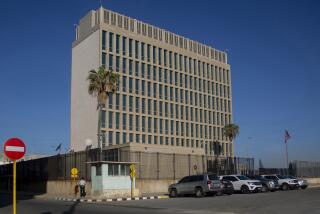Radiation Ruled Out in Gulf War Illness
- Share via
WASHINGTON — The latest federal panel to examine “Gulf War illness” concluded Friday that the Pentagon has been on the right track in its search for causes of the mysterious ailment and ruled out speculation that it might be the result of exposure to low-radioactivity artillery shells and bombs.
In an interim report that was condemned by some veterans’ activists, the presidential advisory panel said that the Pentagon’s investigation was generally “credible,” although it criticized certain narrow aspects of the work.
The Special Oversight Board on Gulf War Illness, headed by former Sen. Warren B. Rudman (R-N.H.), recommended that defense officials expand their fact-gathering efforts, including examination of possible genetic factors.
In the aftermath of the 1990-91 Persian Gulf War with Iraq, more than 20,000 U.S. veterans complained of a variety of symptoms that they believe are related to their participation in the conflict. The complaints include fatigue, nausea, joint pain, memory loss and flu-like symptoms.
But many government and private researchers have been unable to pinpoint the cause. Last year, a presidential advisory committee said it was unable to identify a single cause but said that the stress and anxiety of war could be a big source of the symptoms.
Some activists have put increasing emphasis on a theory that the complaints have arisen because of the coatings of depleted uranium on some artillery shells and bombs.
The uranium coating hardens the shells, allowing them to better penetrate enemy tanks and other armor. Critics contend that the dust they release has dangerous health effects. The issue stirred controversy in the recent bombing of Yugoslavia, as well as in the Persian Gulf conflict.
The Special Oversight Board, however, cited studies by the Pentagon and the Rand Corp. think tank that found no link between these low-radioactivity substances and the maladies.
“The board agrees with the conclusion that the available evidence does not support claims that depleted uranium is causing the undiagnosed illnesses some Gulf War veterans are experiencing,” the report said.
This finding brought a quick retort from the National Gulf War Resource Center, an advocacy group in Washington. “It’s an incomplete whitewash and a failure,” said Paul Sullivan, a Gulf War veteran and an official of the group. Other research has suggested that the radioactivity settles in bones and a variety of organs, he said.
The group postponed findings on another widely discussed theory: that the complaints arose from the effects of oil well fires in Kuwait, which spread airborne contaminants throughout the region.
In a series of 12 recommendations, the panel said that the Pentagon should consider whether to distribute electronic ID tags to soldiers to better track where they have been and what they have been exposed to during a conflict. One of the vexing questions of the Persian Gulf War is how many soldiers were exposed to risk when troops blew up shells containing dangerous chemicals at an Iraqi depot at Kamasiyeh, Iraq.
Among its criticisms, the report said that the Pentagon’s research effort experienced “mission creep” when officials began working up information papers on subjects that should have been considered beyond the scope of the investigation.
Overall, however, the interim report found that the Defense Department has been “on the right path,” said Roger Kaplan, a spokesman.
The group has seven members, including one retired general, two retired admirals and a retired senior enlisted man. The panel was organized by President Clinton in February 1998, when the term of the previous advisory panel expired.
More to Read
Sign up for Essential California
The most important California stories and recommendations in your inbox every morning.
You may occasionally receive promotional content from the Los Angeles Times.














